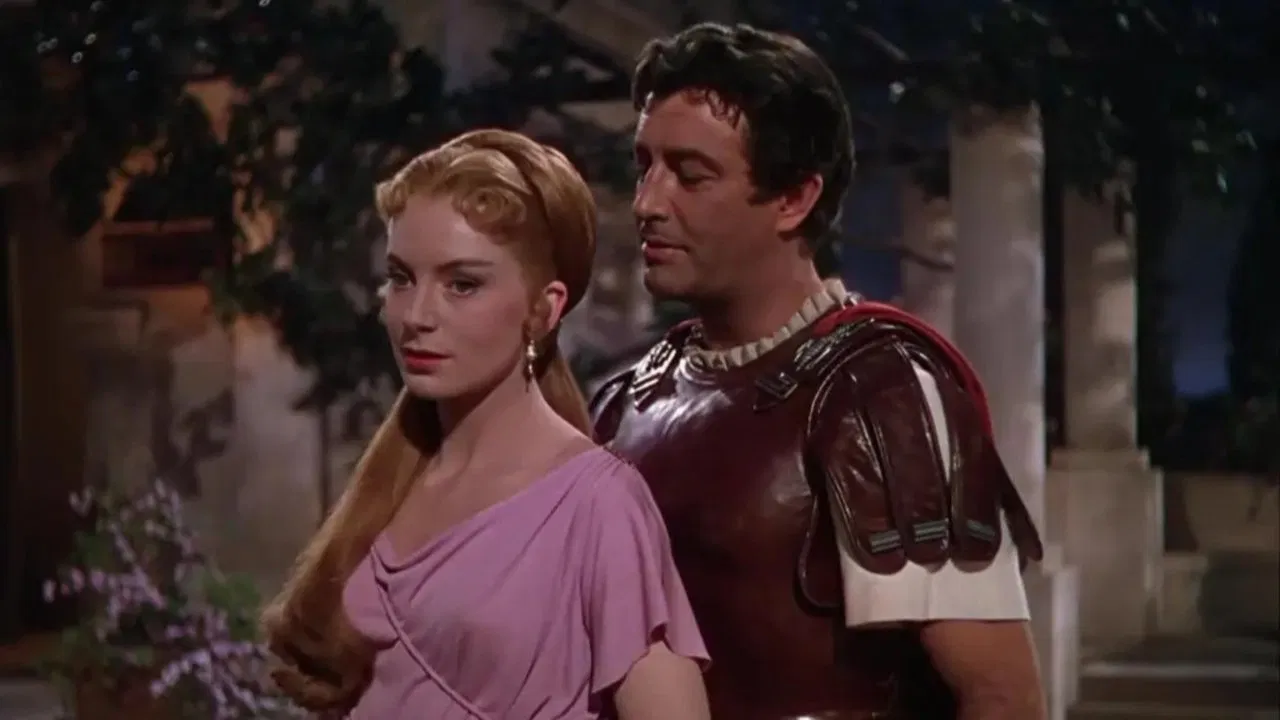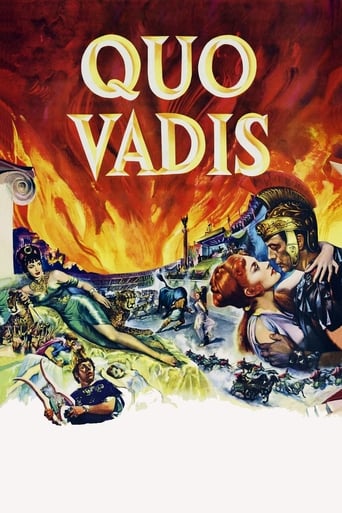

It’s an especially fun movie from a director and cast who are clearly having a good time allowing themselves to let loose.
... View MoreThis movie was so-so. It had it's moments, but wasn't the greatest.
... View MoreAt first rather annoying in its heavy emphasis on reenactments, this movie ultimately proves fascinating, simply because the complicated, highly dramatic tale it tells still almost defies belief.
... View MoreA lot of perfectly good film show their cards early, establish a unique premise and let the audience explore a topic at a leisurely pace, without much in terms of surprise. this film is not one of those films.
... View MoreSigh.....I might be more tempted to be religious myself if it ever seemed like religious people were having any fun. Instead, there are movies like "Quo Vadis," where Christians display all the vivacity of a wooden nativity scene."Quo Vadis" ushered in an era of Hollywood Biblical epics, stiff, pious, unwatchable pageants sprawled across movie screens in garish Technicolor. This three-hour film comes to life only a few times, almost all of them when Peter Ustinov shows up on screen as Emperor Nero and devours the scenery around him. Things also perk up a bit when the Christians are fed to the lions, a moment that's supposed to horrify us but one that we instead welcome with a sense of relief that we won't have to spend any more time with these boring and emotionless people. Even these scenes are rather desultory and could have taken some lessons from Cecil B. DeMille's jaw-droppingly tacky depiction of the same events in "The Sign of the Cross" from 1933.Deborah Kerr is lovely as always, but she fades into the background as the film's heroine, a crime for which I can never forgive the supremely pedestrian director Mervyn LeRoy. When you let Deborah Kerr fade into the background, you should have your DGA card revoked. Instead, he gives most of the screen time to Robert Taylor, who plays a Roman soldier like a macho, and a rather dim one at that. This film talks and talks and talks and talks for three hours and left me thinking that if I had been alive at the time, I would have wanted to hang out with Nero. At least there would have been better food.The Academy went ga-ga over this film and dutifully handed out eight Oscar nominations to it, though it went home completely empty handed. It was nominated for Best Picture, Best Supporting Actor (Ustinov), Best Supporting Actor (Leo Genn, another bright spot in the cast if only because his British accent makes the wooden dialogue more palatable), Best Color Art Direction, Best Color Cinematography, Best Color Costume Design, Best Film Editing, and Best Dramatic or Comedy Score by Miklos Rosza, one of those jangling, harsh scores that appear to be a prerequisite for Biblical epics.Grade: D+
... View MoreThis is a classic of the golden era of Hollywood and one of the great epics that were filmed there. The action takes place in Rome in the time of Nero and crosses two distinct narratives: the life of this emperor, famous for his madness, and an impossible love between a pagan Roman general and a young crypto-Christian, hostage of the empire. The main characters are embodied by Sir Peter Ustinov (as the Emperor), Robert Taylor (as General Marcus Vinicius) and Deborah Kerr (as Lygia), three actors who have achieved in this film the top of their careers in both quality and popularity. But our eyes turns almost instinctively to Ustinov, who deserves a standing ovation because of his inspired interpretation. He did not act, he really incarnated the emperor. The deep accent of the British actor and his talent for declaiming helped greatly to accentuate the theatricality of the character, who was a deeply disturbed man, convinced that he was a great artist.Okay, I believe that little in this movie corresponds to the historical reality, but the truth is that today, fifty-many years after this film premieres, we have a deeper knowledge of Nero and his reign. By the time the film was shot, much of the information we had came almost exclusively from Roman chronicles written after his reign, deliberately designed to denigrate him. Either way, the movie is historically faithful to what we knew at the time and that is enough for historical rigor. The scenarios are truly exquisite, thought to the detail, and give the public a clear idea of the grandeur of Imperial Rome and the Roman Fora. The soundtrack, by Miklós Rózsa, is fantastic and I consider it one of the most grandiose and epic ever composed for the cinema, although it often appears in the background and ends up overshadowed. The costumes have been very well made and are visually elegant. We still have to think about the huge effort to make a movie like this, with hundreds of full-dress extras and large-scale scenarios. With these films, we understand the true meaning of the term "dream factory", with which the people nicknamed the Hollywood studios.
... View MoreI guess nostalgia would have to be a big part of my evaluation of a movie that is the earliest one I can remember. I must have been about 5-years old when I saw this in a suburban cinema in Sydney around 1952.Three things imprinted themselves: the slave being trampled as the legions march towards Rome; Ursus throwing Croton down the steps, and most vivid of all, Nero looking through the coloured glass ovals - I was a cheap date in those days.I have seen the movie many times since then, but it always seems like an old friend. Of course these days I am a little more discerning about its strengths and weaknesses.The story is gleaned from Henryk Sienkiewicz's slab of a novel, about an all-conquering Roman General, Marcus Vinicius (Robert Taylor), who falls in love with a Christian girl, Lygia (Debora Kerr), set against the backdrop of Rome during the reign of Emperor Nero (Peter Ustinov). It was a great period for an epic; we get massive triumphs - "Remember, you are only a man" - the burning of Rome, and the persecution of the Christians complete with human torches, crucifixions and of course lions - the ancient Romans knew a thing or two about showbiz.Robert Taylor made a very clean-cut, all-Roman kind of guy - he gives the role a suitable touch of arrogance, but his tunics look as though they have just come back from the cleaners, and they didn't spare the Napisan. Taylor seemed to breeze through these types of parts, but there are others who gave the film more gravitas.Deborah Kerr glows in her role, however it's the relationship between Petronius (Leo Genn) and his slave Eunice (Marina Berti) that I find the most touching - he orders her whipped, but not to damage her skin.Then of course there's Peter Ustinov as Nero. Charles Laughton had given Nero a certain piquancy in DeMille's earlier, "The Sign of the Cross", but Ustinov out-lyres him all the way. His Nero is maybe a little one-note; he plays him as a petulant teen possibly dealing with gender issues, but his death scene is pitiable, "Is this then the end of Nero?" There are some great lines in the film, nearly all shared by Petronius and Nero.I think the film is quite spiritual and uplifting when Finlay Currie delivers as Peter. Much of the film's spirituality also comes from Miklos Rozsa's soaring score - conversions are definitely on the cards when a theme such as "The Miracle and Finale" gets the full orchestral treatment.As a movie, "Quo Vadis" is the equivalent in painting to a monumental salon piece by Lawrence Alma-Tadema rather than a more intriguing and challenging work by El Greco or Picasso.However it has its moments with scenes that CGI would find hard to beat, and the Christians in the arena never fail to bring a lump to my throat. And you know what? I still love those coloured glasses.
... View Morefor the wise adaptation of a novel who remains an important declaration of faith. for the acting, who remains memorable for each of lead actors. for the credibility of a society who seems be not only realistic but not presented from a single angle. for the Rome and flames and for the courage to create little more than part of historical blockbusters of period. for the sensitivity of Deborah Kerr, for a Petronius who remains the best interpretation, for the love story who has more poetry than eroticism. and, sure , for Nero by Peter Ustinov. a film who impress and remains seductive after six and half decades. and that is its great virtue.
... View More